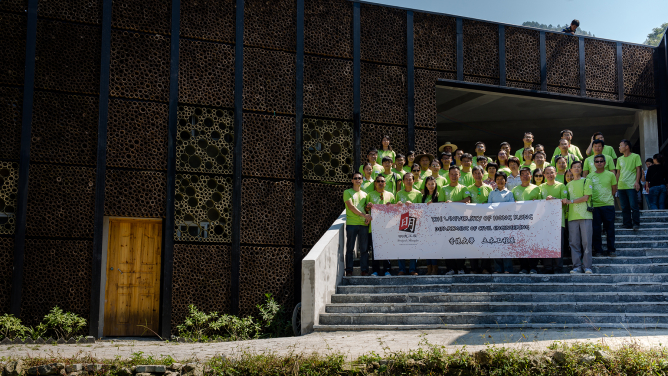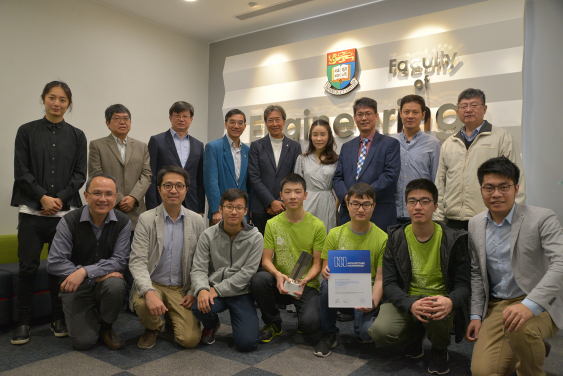Media
Project Mingde: Past and Future Prospects
16 Apr 2019
- 1 / 3
- 2 / 3
- 3 / 3
HKU Faculty of Engineering established Project Mingde in 2003. Under the project, teachers and students go to different places to contribute as volunteers to build schools, dormitories, toilets, and bridges in impoverished villages. These projects aim to enhance the living standards of local villagers and provide education opportunities to school children. They also provide a platform for university students to contribute their skills and knowledge to society, and gain valuable learning experience in return.
Project Mingde was initiated by Professor Nicolas Yeung, a graduate of the Department of Civil Engineering. He decided to donate his time and money to build a new primary school building in Xiali Village, Rongshui County, Guangxi, and he invited HKU Engineering students to participate in this project. The project was a success, and the school was named “Mingde Building” after the first two Chinese characters of the HKU motto, “virtue and wisdom.” This experiential learning program was accordingly named “Project Mingde.”
In the last 15 years since its establishment, teachers, students, and alumni engineers have completed ten real-world construction projects under Project Mingde. These include Mingde Building; Gewu Building, a student dormitory at a minority vocational school; Zhengdong Jie Kindergarten, rebuilt after the original building collapsed in the 2008 Sichuan Earthquake; Chaoyang Bridge, a footbridge in Yingdong Village; Dabao Mingde Pan Community and Cultural Centre, a complex building with classrooms for primary education and other community facilities; Jundi Building, a teachers’ residence of Daping Village Primary School. In addition, Project Mingde has ventured into Vietnam and cooperated with World Vision to build two toilets with sanitation facilities and two libraries at four local primary and secondary schools in Hanoi. More than 400 teachers and students had actively participated in these projects. Project Mingde requires students to take part in all stages of construction, from land surveying and structural design to site supervision and inspection, and to work with local contractors under the guidance of teachers and alumni engineers.
Fifteen Years of Achievements
The Dabao Mingde Pan Community and Cultural Centre, one of the completed projects, won two international awards. After the 2018 Architizer A+ Popular Choice Award (Architecture + Humanitarianism Category), the Dabao project recently also won the prestigious 2018 Architecture MasterPrize for Architectural Design / Educational Buildings. This project was jointly designed and built by project architect Ms Elisabeth Lee and the Project Mingde Engineering Team.
Dabao Village is situated in a mountainous area and is constantly covered by fog. Mr Kwong Long Chi, one of the student participants in this project, shared his experience. During a time of heavy rain, the volunteers’ car broke down and was stuck in mud. Everyone had to get out of the car and push it to the village. Due to unpredictable weather and a treacherous uphill road, it was difficult to transport construction materials to the site.
Project Mingde’s Engineering Team decided to use local natural resources (bamboo tubes) to build the façade wall. This solution reduced the need for construction material transportation, and the bamboo wall design could regulate noise and light while ensuring a quiet environment for classrooms. Since bamboo tubes are not commonly used for construction, their load-bearing capacity and durability posed a major challenge. Therefore, students created a model in the laboratory using the bamboo tubes, and conducted assessments to determine the appropriate tube sizes and construction method.
Ms Elisabeth Lee notes that “it is not a brilliant idea that makes a building a piece of great architecture, but rather creating a design that responds to and shows a deep understanding of the people and place for which it was designed. The outcome of the project was the realisation of an ingenuous vision into a piece of architecture attuned to its environment and transformed by obstacles that arose during this process.”
The HKU Motto of “Virtue and Wisdom” Lives On
This project fully demonstrates the spirit of Project Mingde: “we build as we grow.” By participating in real-world construction projects, students gained hands-on knowledge of design and construction, and solved a range of engineering problems. The two international awards are an affirmation of the contributions of the teachers, students, alumni, and stakeholders involved in Project Mingde.
Professor Nicolas Yeung states that Project Mingde has moved with the times, evolving gradually from a personal project into an organised, sustainable curriculum item. It started as a building project intended to improve education in a mountainous area and to provide mentorship to university students. Now it has been reborn as an experiential learning curriculum that combines knowledge with hands-on practice. Project Mingde will continue to give students from other faculties the chance to participate in this experiential learning program. The eternal flame of civilisation will be passed on from generation to generation, and the HKU motto of “virtue and wisdom” will live on.
The Dean of HKU Engineering, Professor Christopher Chao, firmly shows his support to Project Mingde. He says, “As an alumnus of HKU, I am proud that our teachers and alumni volunteered to organise Project Mingde, which not only enriches students’ experiential learning, but also enhances their all-round competencies. We hope to sustain and further promote the spirit of Project Mingde.”
Media enquiries:
Ms Celia Lee, Faculty of Engineering, HKU (Tel: 3917 8519; Email: leecelia@hku.hk) or
Miss Bonnie Tsang, Faculty of Engineering, HKU (Tel: 3917 1924; Email: bonniepy@hku.hk)


